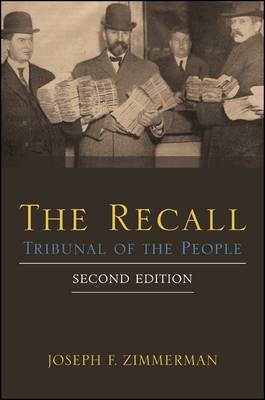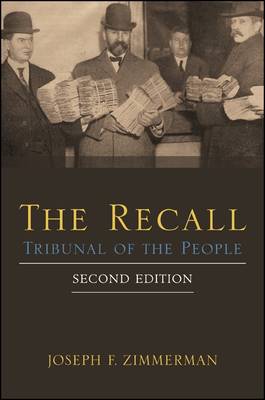
- Afhalen na 1 uur in een winkel met voorraad
- Gratis thuislevering in België vanaf € 30
- Ruim aanbod met 7 miljoen producten
- Afhalen na 1 uur in een winkel met voorraad
- Gratis thuislevering in België vanaf € 30
- Ruim aanbod met 7 miljoen producten
Zoeken
€ 53,45
+ 106 punten
Uitvoering
Omschrijving
The recall, or "election in reverse," is meant to allow voters to remove an elected official from office prior to the completion of his/her term in office. In this revised second edition of The Recall, Joseph F. Zimmerman examines the rise of the recall in the United States and its use by American voters. Proponents of the recall believe the threat of removal from office would ensure that elected officials would act in accord with the public's will, while opponents fear their use would disrupt and inhibit public officers in the performance of their duties. Zimmerman provides a detailed analysis of how the recall has functioned in practice and discovers that the recall has seldom been employed against elected state officials. Although used more often against local government officials, the rate is still not exceptionally high when one considers the extremely large number of elected officials. After a century of use in the United States, the recall has not produced a new era of public official responsibility as hoped for by proponents, but neither has it caused extensive disruption of state and local governments, the original concern of early opponents.
Specificaties
Betrokkenen
- Auteur(s):
- Uitgeverij:
Inhoud
- Aantal bladzijden:
- 223
- Taal:
- Engels
Eigenschappen
- Productcode (EAN):
- 9781438449265
- Verschijningsdatum:
- 2/01/2015
- Uitvoering:
- Paperback
- Formaat:
- Trade paperback (VS)
- Afmetingen:
- 157 mm x 221 mm
- Gewicht:
- 317 g

Alleen bij Standaard Boekhandel
+ 106 punten op je klantenkaart van Standaard Boekhandel
Beoordelingen
We publiceren alleen reviews die voldoen aan de voorwaarden voor reviews. Bekijk onze voorwaarden voor reviews.











